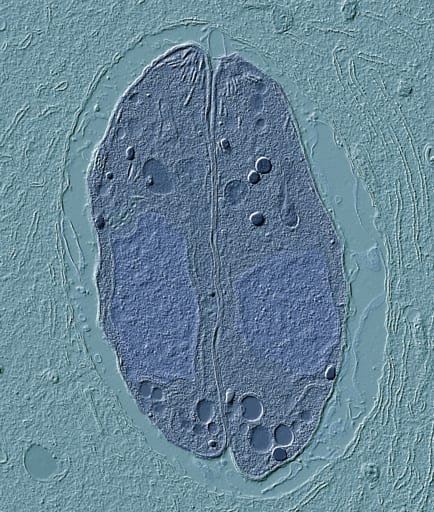Bruno Martorelli Di Genova wants to eliminate the use of cats in the study of the parasite Toxoplasma gondii, and the results of his groundbreaking research suggest he could do just that.
Martorelli Di Genova, a native of São Paulo, Brazil, whose background is in the study of parasites and neglected disease, came to Wisconsin in August 2016 to work in the laboratory of Dr. Laura Knoll in the Department of Medical Microbiology and Immunology at UW–Madison.
The Knoll lab’s ongoing research centers on the study of chronic infection caused by the parasite Toxoplasma gondii, or T. gondii, a parasite that Martorelli Di Genova identifies as one of the leading causes of foodborne illness-related deaths in the United States. The Centers for Disease Control and Prevention estimates that in other places throughout the world, particularly those with hot, humid climates and lower altitudes, greater than 60% of some populations have been infected by the parasite.
Infection from T. gondii begins when a host is exposed to the parasitethrough a contaminated source such as uncooked meat. The parasite rapidly replicates until the immune system kicks-in and stops the active spread of infection, at which point the parasite transitions into a dormant cyst that resides in the host for the remainder of its life.
This asexual phase occurs in all warm-blooded animals. However, the process of T. gondii infection looks a little bit different for cats.
Unlike other warm-blooded hosts, when a cat ingests T. gondii, the parasite infects cells in the cat’s small intestine and differentiates into its sexual stages. This sexual phase of T. gondii occurs only in felines, and because of this, T. gondii research is often conducted using cats.

Martorelli Di Genova knew he wanted to get away from this.
“We understand that there’s a need to change models, and we understand that there is also a need to go beyond the classical way of doing research,” Martorelli Di Genova says.
“He’s trying to develop this mouse model so that we don’t use cats in research anymore,” Knoll says. “That’s the goal right now.”
There are numerous benefits to using mice rather than cats in research, however one of the primary advantages is that scientists tend to be more familiar with mice given how commonly they are used in lab research. The ability to study T. gondii in mice would thus simplify the research process and quicken its pace, potentially helping scientists find treatments, faster.
To accomplish this goal, Martorelli Di Genova first had to identify why T. gondii’s sexual phase occurs only in cats in order to be able to recreate those conditions in an alternate model, such as mice. In a paper set to be published in a scientific journal, Martorelli Di Genova explains how he was able to do just that and recapitulate T. gondii’s entire life cycle in mice for the first time, breaking the species barrier and opening the door for advances in T. gondii research.
In a recent article published by national newspaper The Atlantic, this finding is described by scientists across the country as having “huge implications” and being “extremely important for the field.” The ability to replicate the life cycle of T. gondii in mice could simplify T. gondii research, bringing scientists one step closer to finding treatments for infection while eliminating the need for cats in T. gondii research.
Since August 2018, Martorelli Di Genova’s research has received financial support from the Morgridge Metabolism Interdisciplinary (MMI) Fellowship, a competitive program for outstanding early-stage graduate students and postdoctoral fellows developed as part of the Morgridge Institute’s Metabolism Initiative. Martorelli Di Genova is the second MMI Fellow to be named since the program’s launch, following 2017-18 Fellow Prasanth Kumar, a graduate student in the chemistry department at UW–Madison.
The initiative, led by metabolism director Dave Pagliarini, seeks to advance and amplify metabolism-related research in Madison and has three pillars: Talent, Technology and Community. The MMI Fellowship is part of the community pillar.
